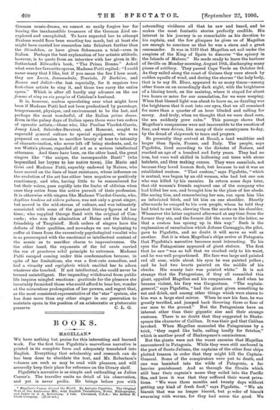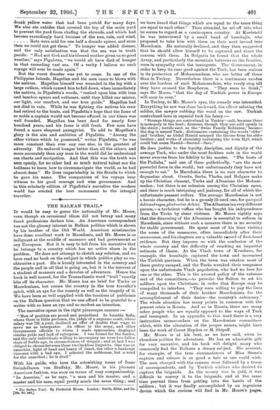BOOKS.
MAGELLAN.* WE have nothing but praise for this interesting and learned work. For the first time Pigafetta's marvellous narrative is printed in its complete form and adequately translated into English. Everything that scholarship and research can do has been done to elucidate the text, and Mr. Robertson's volumes are such as may be read with pleasure, and will assuredly keep their place for reference on the library shelf.
Pigafetta's narrative is as simple and enthralling as Julius Caesar's. The traveller omits no detail of his observation, and yet is never prolix. He brings before you with
• Magellan's Voyage Aronntl the World. By Antonio Pigafetta. The Original Text of the Ambrosial, MS., with English Translation, Notes, Bibliography, and Index by .1. A. Robertson. 2 vols. Cleveland, U.S.A.: the Arthur H. Clark Company. [$7.50 net.]
astounding vividness all that he saw and heard, and he makes the most fantastic stories perfectly credible. His interest in his journey is as remarkable as his devotion to his captain, and the few glimpses he gives us of Magellan are enough to convince us that he was a stern and a great commander. It was in 1519 that Magellan set sail under the auspices of the King of Spain to discover "the spicery in the Islands of Maluco." He made ready to leave the harbour of Seville on Monday morning, August 10th, discharging many pieces of artillery. They passed Cape Verde on October 3rd. As they sailed along the coast of Guinea they were struck by sudden squalls of wind, and during the storms "the holy body, that is to say St. Elmo, appeared to us many times—among other times on an exceedingly dark night, with the brightness of a blazing torch, on the maintop, where it stayed for about two hours or mbre for our consolation, for we were weeping. When that blessed light was about to leave us, so dazzling was the brightness that it cast into our eyes, that we all remained for more than a quarter of an hour blinded and calling for mercy. And truly, when we thought that we were dead men, the sea suddenly grew calm." This passage shows that Magellan's companions were not inaccessible to the emotion of fear, and were driven, like many of their countrymen to-day, by the dread of shipwreck to tears and prayers.
So presently they arrived at Brazil, a land wealthier and larger than Spain, France, and Italy. The people, says Pigafetta, lived according to the dictates of Nature, and reached an age of a hundred and forty years. They had no iron, but were well skilled in hollowing out trees with stone hatchets, and thus making canoes. They were cannibals, not because they loved human flesh, but because to eat it was an established custom. "That custom," says Pigafetta, "which is mutual, was begun by an old woman, who had but one son who was killed by his enemies. In return some days later, that old woman's friends captured one of the company who had killed her son, and brought him to the place of her abode. She seeing him, and remembering her son, ran upon him like an infuriated bitch, and bit him on one shoulder. Shortly afterwards he escaped to his own people, whom he told they bad tried to eat him, shewing them the marks on his shoulder. Whomever the latter captured afterward at any time from the former they ate, and the former did the same to the latter, so that a custom has sprung up in this way." Such is the explanation of cannibalism which Johane Carnaggio, the pilot, gave to Pigafetta, and no doubt it will serve as well as another. But it is when Magellan's ships arrive at Patagonia that Pigafetta's narrative becomes most interesting. To his eyes the Patagonians appeared of giant stature. The first that he saw "was so tall that we reached only to his waist, and he was well proportioned. His face was large and painted red all over, while about his eyes he was painted yellow ; and he bad two hearts painted on the middle of his cheeks. His scanty hair was painted white." It is not strange that the Patagonians, if they all resembled this giant, appalled Magellan and his companions. And when he .became violent, his fury was Gargantuan. "The captain- general," says Pigafetta, "had the giant given something to eat and drink, and among other things which were shewn to him was a large steel mirror. When he saw his face, he was greatly terrified, and jumped back throwing three or four of our men to the ground." But the Patagonians have an interest other than their gigantic size and their strange customs. There is no doubt that they suggested to Shake- speare the character of Caliban. It was their god that Caliban invoked. When Magellan manacled the Patagonians by a trick, "they raged like bulls, calling loudly for Setebos," which is another proof of Shakespeare's omniscience.
But the giants were not the worst enemies that Magellan encountered in Patagonia. While they were still anchored in the port of Santo Juliano, the captains of the other four ships plotted treason in order that they might kill the Captain- General. Some of the conspirators were put to death, and one was banished into the wilds of Patagonia, a far heavier punishment. And so through the Straits which still bear their captain's name they sailed into the Pacific Sea, and here it was that they suffered their worst priva- tions. "We were three months and twenty. days without getting any kind of fresh food," says Pigafetta. "We ate biscuit that was no longer biscuit, but pc wder of biscuit swarming with worms, for they had eaten the good. We
drank yellow water that had been putrid for many days. We also ate oxhides that covered the top of the main yard to prevent the yard from chafing the shrouds, and which had become exceedingly hard because of the sun, rain, and wind.
Rats were Bold for one half a ducado apiece, and even then we could not get them." To hunger was added disease, and the only satisfaction was that the sea was in truth pacific. "Had not God and his blessed mother given us so good weather," says Pigafetta, "we would all have died of hunger in that exceeding vast sea. Of a verity I believe no such voyage will ever be made again."
But the worst disaster was yet to come. In one of the Philippine Islands, Magellan and his men came to blows with the natives. Magellan himself was wounded in the leg with a large cutlass, which caused him to fall down, when immediately the natives, in Pigafetta's words, "rushed upon him with iron and bamboo spears and cutlasses, until they killed our mirror, our light, our comfort, and our true guide." Magellan had not died in vain. While he was fighting the natives his crew had retired to the boats, and Pigafetta's hope that the fame of so noble a captain would not become effaced in our times was well founded. Magellan has been dead for nearly four hundred years, and his fame is still fresh. Few men have found a more eloquent panegyrist. To add to Magellan's glory is the aim and ambition of Pigafetta. "Among the other virtues which he possessed," writes Pigafetta, "he was more constant than ever any one else, in the greatest of adversity. He endured hunger better than all the others, and more accurately than any man in the world did he understand sea charts and navigation. And that this was the truth was seen openly, for no other had so much natural talent nor the boldness to learn how to circumnavigate the world, as he had almost done." He lives imperishably in the Straits to which he gave his name. The companions of his voyage bear witness to his good courage and wise governance. And in this scholarly edition of Pigafetta's narrative the modern world has erected the best monument to the intrepid traveller.







































 Previous page
Previous page